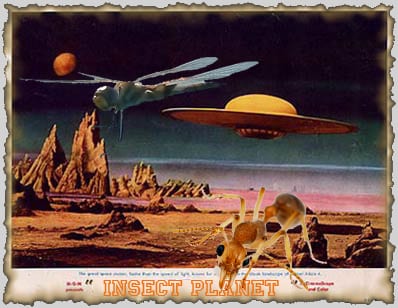We’ve confessed several times over that we’re unapologetic sci-fi nerds for the most part on the Postconsumers content team. We even dedicated one of our evergreen Better Than Black Friday items to a full day of sci-fi movies. Perhaps it’s our hope for a better future that makes us love science fiction so much, or maybe it’s just the cool gadgets and generally great storytelling. Increasingly, the rest of the nation (and for that matter the world) has been catching up and realizing that the sci-fi genre is worth their time. Since we’re taking this month to delve a bit deeper into the relationship between technology and consumerism, we thought we’d also take a little bit of time to talk about that in terms of sci-fi entertainment. In fact, because it’s a pet favorite topic of ours, we’re dedicating two different looks at it. The second, which will be coming up shortly, tackles the full consumerization of sci-fi. But today we thought we’d take a look at the smaller topic of consumerization portrayed in some of our favorite contemporary sci-fi movies.
The Hunger Games: Obviously, Stuff Keeps You Alive and Makes You Happy
We unapologetically love Jennifer Lawrence and The Hunger Games movie franchise, but the idea that “stuff” is associated with a better life and that it has value beyond being “stuff” is present all through the movie. Don’t get us wrong. We’re not saying that the abject poverty portrayed in the outer districts compared to the lush lifestyle of the capital isn’t an important socio-economic commentary about what will happen if we don’t find a way to make the current trajectory of socio-economic stratification more flat and fair. But The Hunger Games portrays “stuff” in both a positive and negative light in a way that we like. On the positive side, the citizens of the capital, where “stuff” and “status by stuff” is prevalent, are portrayed as shallow, heartless and frankly inhuman. We don’t think that you’ll end up inhuman if you buy things, but we do think that defining yourself by your “stuff” strips away at your basic humanity. On the downside of the “stuff” portrayal in The Hunger Games, having more material goods is shown to make you happier. Katniss’ family is happier once they get a certain level of affluence. But the best part of The Hunger Games portrayal of wealth and “stuff” is that while Katniss’ family does achieve some comfort from more affluence, it doesn’t solve their problems or make them ultimately happy. What does that is their love for each other and connections with the people who matter to them. One of the reasons we love this film so much is that we adore how it portrays the overall relationship between “stuff” and happiness.
Star Wars (Every Episode!)
Hey, all we have to say is that everybody covets a lightsaber in these movies! But you’ll also notice that every portrayal of royalty comes with jewels and nicer airships. The Star Wars movies are actually quite clean of consumerism messages within the movie (we’ll talk about all of that sales merchandise later on), but how much can a good Yoda covet on a deserted swamp planet, really?
Jupiter Ascending (Yes, We Watched It)
People really seemed to hate this movie, but we’ll watch any Channing Tatum project and rate it above average! The “stuff” of consumerism in Jupiter Ascending isn’t “stuff” – it’s the energy essence of humans farmed to create a substance that gives alien humans everlasting life. We’re not going to argue with you that another couple decades of youth isn’t more valuable than a gaming console, because it is. But the consumerism message is clear. People in the Jupiter Ascending universe fight and struggle to get more, more, more (youth), but in the end they never achieve the satisfaction of enough because they are always chasing after more. The problem with addictive consumerism isn’t just the eco-impact and emotional displacement of “stuff,” it’s the endless obsession with “more, more, more.” Jupiter Ascending nails this concept and its obviously tragic outcomes.
Elysium: Socio-Economics at Its Worst
While this Matt Damon vehicle doesn’t touch on consumerism per say, it does show the inevitable outcome of continued rapid socio-economic stratification caused largely by the disease of addictive consumerism being unleased on the human population. In the movie, those with means live “off world” in a utopian luxury. Those without means live in what can only be described as the world’s largest ghetto, because it is the entire planet. If you’d like to see the world in the future if we don’t solve addictive consumerism and its symptomatic socio-economic stratification, watch this movie.
Or, If You Want to See the Worst Case Scenario of the Outcome of Consumerism and Socio-Economic Stratification…
Watch Snowpiercer. In this film, not only has the socio-economic division become so intense that it elicits a violent revolt, but industrial-created climate change has destroyed the earth so that the only way to survive is to live on a train that constantly keeps moving through the arctic wasteland that is the planet. Be warned, this is not an uplifting movie in any way!
Of course, some of this article was tongue in cheek, but in almost any science fiction view of the future you can see the outcomes and the ongoing existence of addictive consumerism. The real question is how do we create a sci-fi future utopia that truly lets go of these concepts?
Did we miss a blockbuster sci-fi movie that has very real messaging about the future and consumerism? If so, tell us about it on the social media channels below.
Facebook | Twitter | Instagram | Tumblr | Pinterest | Google+ | Medium
Photo Credit: Andy via Flickr




